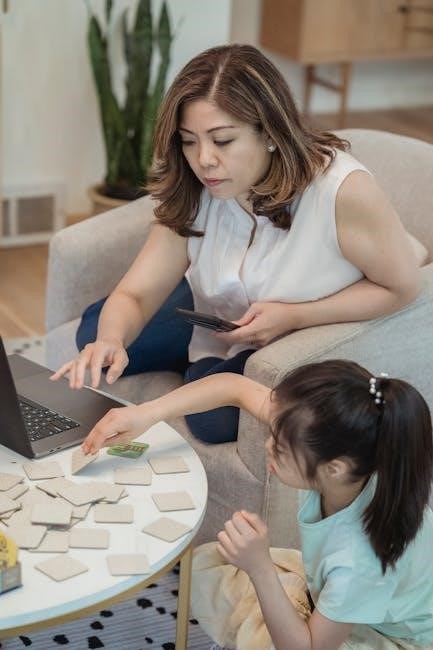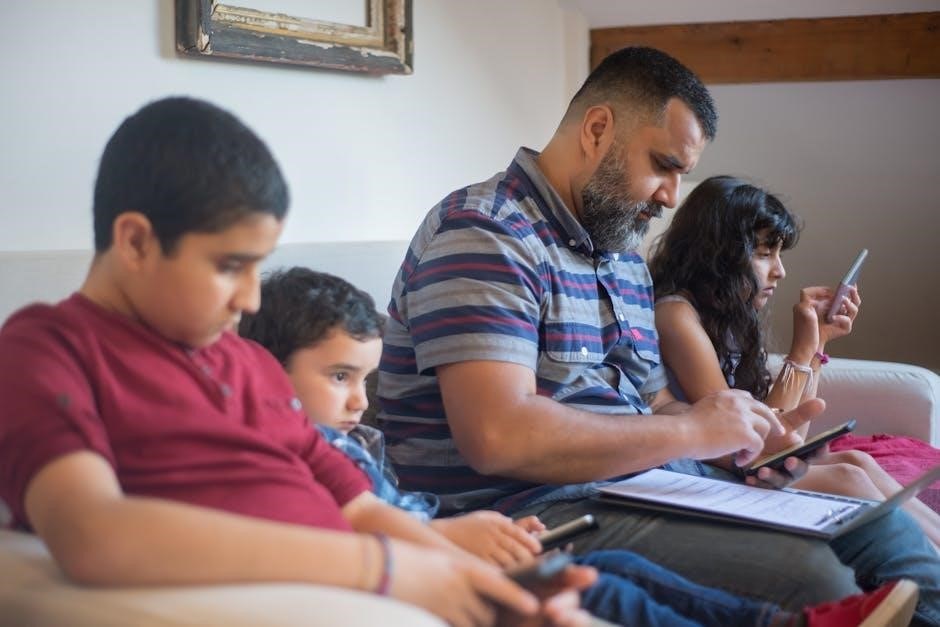Parent education empowers caregivers with skills and knowledge to support child development. It combines group and individual approaches‚ fostering parental competence and child well-being through structured learning experiences.
1.1 Definition and Scope of Parent Education
Parent education refers to structured learning experiences designed to equip parents with knowledge‚ skills‚ and strategies to support their children’s development. It encompasses a broad range of topics‚ including child development‚ parenting techniques‚ and community resources. The scope of parent education extends from group-based programs to individualized support‚ addressing diverse parental needs. It aims to enhance parent-child relationships‚ foster healthy development‚ and empower caregivers to navigate challenges effectively. By focusing on evidence-based practices‚ parent education promotes lifelong learning and adaptive parenting strategies.
1.2 Historical Evolution of Parent Education
The concept of parent education has evolved significantly over time‚ emerging as a formal field in the early 20th century. Initially‚ it focused on home economics and child development‚ influenced by societal shifts and advancements in psychology. The 1960s and 1970s saw increased emphasis on parent involvement in education‚ with government programs and community initiatives. Modern parent education incorporates diverse approaches‚ blending group and individual methods to address evolving family needs. This historical progression reflects changing societal values and the growing recognition of parenting as a skill that can be nurtured through education and support.

1.3 Importance of Parent Education in Modern Society
Parent education is vital in modern society as it empowers caregivers to nurture children effectively. It fosters healthy child development‚ enhances parental confidence‚ and strengthens family relationships. By addressing diverse parenting challenges‚ parent education supports emotional‚ social‚ and cognitive growth in children. It also promotes societal well-being by preparing the next generation to thrive. Additionally‚ parent education helps bridge gaps in knowledge‚ enabling parents to navigate complex issues like technology and mental health. Ultimately‚ it contributes to creating resilient families and communities‚ making it a cornerstone of societal progress and individual well-being in today’s fast-paced world.

Working with Parent Groups

Parent groups provide a collaborative learning environment‚ fostering mutual support and shared experiences among caregivers. They enable collective problem-solving and skill-building‚ enhancing parenting effectiveness and community bonds.
2.1 Benefits of Group Parent Education
Group parent education fosters a sense of community and shared learning‚ reducing feelings of isolation. It provides a platform for parents to exchange experiences‚ strategies‚ and support. Through collaborative discussions‚ participants gain diverse perspectives‚ enriching their understanding of parenting challenges. Group settings also allow for the demonstration of parenting techniques‚ making concepts more tangible. Additionally‚ the collective environment encourages accountability and motivation among participants. By addressing common issues together‚ parents develop practical skills and confidence. This approach not only enhances individual parenting abilities but also strengthens overall family well-being‚ creating a positive ripple effect in communities.
2.2 Designing Educational Content for Group Parent Education

Designing effective content for group parent education requires a structured approach. It should align with participants’ needs‚ incorporating research-based strategies and practical tools. Content should be interactive‚ using activities like role-playing and group discussions to engage parents. Topics such as child development‚ communication‚ and conflict resolution are essential. Materials must be accessible and culturally sensitive‚ ensuring relevance for diverse audiences. Including real-life scenarios helps parents apply concepts directly to their experiences. Regular feedback from participants ensures content remains impactful and responsive to their evolving needs‚ fostering a dynamic and supportive learning environment for all involved.
2.3 Facilitation Skills for Leading Parent Groups
Effective facilitation in parent groups requires strong communication and interpersonal skills. Leaders must create a safe‚ inclusive environment‚ encouraging open dialogue and active participation. Active listening‚ non-verbal cues‚ and empathy are essential for building trust. Facilitators should guide discussions without dominating them‚ ensuring diverse perspectives are heard. Conflict resolution skills are crucial for managing disagreements. Adapting to group dynamics and maintaining focus on goals are key; Training in facilitation techniques‚ such as brainstorming and reflective questioning‚ enhances effectiveness. Regular feedback from participants helps refine these skills‚ fostering engaging and productive group sessions that meet the needs of all members.
2.4 Managing Difficult Moments in Parent Groups
Managing difficult moments in parent groups requires empathy‚ active listening‚ and conflict resolution skills. Leaders should remain calm‚ acknowledge emotions‚ and redirect conversations constructively. Setting clear expectations and encouraging respectful communication helps prevent conflicts. If tensions arise‚ focusing on shared goals and fostering collaboration can de-escalate situations. Leaders should validate diverse perspectives while maintaining a neutral stance. Encouraging open dialogue and providing guidance without taking sides ensures a positive environment. Training in conflict resolution and staying attuned to group dynamics are essential for effective management. These strategies help maintain focus and ensure productive outcomes‚ even in challenging circumstances.

Working with Individuals
Working with individuals allows personalized parent education‚ addressing unique needs through tailored strategies. This fosters parental competence and supports child development effectively.
3.1 individual Parent-Child Interaction Time
Individual parent-child interaction time is a laboratory for learning‚ fostering meaningful connections and skill development. It allows parents to observe and practice effective strategies‚ guided by educators‚ promoting emotional support and cognitive growth. This personalized approach helps parents address specific challenges‚ ensuring tailored interventions. By focusing on individual needs‚ parent-child interaction time enhances parental competence and strengthens relationships‚ creating a nurturing environment for children to thrive.
3.2 Strategies for One-on-One Parent Education
One-on-one parent education offers personalized support‚ addressing unique challenges and fostering tailored growth. Active listening and open dialogue build trust‚ enabling educators to adapt strategies to individual needs. Providing specific‚ actionable feedback helps parents refine their skills. Role-playing and real-life scenario discussions allow parents to practice new techniques. Setting clear‚ achievable goals ensures progress and accountability. Regular follow-up sessions reinforce learning and adapt strategies as needed. This approach empowers parents to address specific concerns effectively‚ promoting confidence and competence in their parenting role.
3.3 Addressing Unique Parental Needs
Addressing unique parental needs requires a tailored approach‚ recognizing the diversity of challenges faced by individuals. Cultural‚ socioeconomic‚ and personal circumstances shape distinct requirements. Personalized strategies‚ such as adaptive learning plans‚ ensure relevance and effectiveness. Active listening and empathy are crucial in understanding specific concerns. Collaborative goal-setting empowers parents to address their unique challenges. Providing access to diverse resources‚ such as interactive guides or workshops‚ further supports individual needs. Regular feedback and adaptability ensure continuous improvement. By acknowledging and addressing these unique aspects‚ parent education fosters inclusive and effective support‚ leading to better outcomes for both parents and children.

Combining Group and Individual Approaches
Combining group and individual approaches in parent education creates a balanced and effective learning environment. This blend allows parents to benefit from shared experiences and targeted support‚ leading to improved parenting skills and child development.
4;1 Synergy Between Group and Individual Learning
The synergy between group and individual learning enhances parent education effectiveness. Group settings foster collective engagement and shared experiences‚ while individualized approaches address unique needs and circumstances. This combination allows parents to gain practical insights from others while receiving personalized guidance. Such integration ensures comprehensive skill development and tailored support‚ maximizing the impact of parent education programs. By blending these methods‚ educators create a holistic learning environment that caters to diverse parental needs‚ ultimately benefiting both parents and children.
4.2 Creating a Balanced Parent Education Program
A balanced parent education program integrates group and individual learning to meet diverse needs. It combines structured‚ evidence-based content with flexibility to address unique challenges. Group sessions foster community and shared learning‚ while individual support tailors strategies to specific situations. Programs should include practical tools‚ interactive activities‚ and opportunities for reflection. Facilitators play a crucial role in guiding both formats‚ ensuring engagement and relevance. This balanced approach promotes holistic development‚ empowering parents with the skills and confidence to nurture their children effectively. By blending these elements‚ programs achieve long-term impact and adaptability to evolving parental needs.

Professional Growth and Development
Continuous learning and skill enhancement are vital for parent educators to stay effective. Professional development ensures they remain equipped to support diverse family needs and evolving challenges.
5.1 Continuous Learning for Parent Educators
Continuous learning is essential for parent educators to remain effective. It ensures they stay updated on research‚ methodologies‚ and diverse family needs. Through workshops‚ training‚ and peer collaboration‚ educators refine their skills‚ addressing evolving challenges in parent education. This ongoing development fosters innovation and adaptability‚ enabling educators to deliver impactful programs. By prioritizing learning‚ they enhance their ability to support parents in nurturing child development. Continuous professional growth ensures parent educators remain equipped to address complex issues and promote positive parenting practices‚ ultimately benefiting both families and communities.
5.2 Building Competencies in Parent Education
Building competencies in parent education involves developing essential skills and knowledge to effectively support parents. Key areas include communication‚ cultural sensitivity‚ and understanding child development. Educators must also master facilitation techniques and adapt to diverse learning styles. Competencies are strengthened through continuous learning‚ practical experience‚ and feedback. Staying updated on research and evidence-based practices ensures educators can address complex family dynamics. By enhancing their expertise‚ parent educators become more effective in fostering positive parenting practices and promoting healthy child development. This ongoing skill development is vital for meeting the evolving needs of families and communities.
Accountability and Program Evaluation
Accountability and program evaluation ensure parent education initiatives are effective and impactful. Regular assessments and outcome tracking help improve program quality and maintain stakeholder trust.
6.1 Measuring the Impact of Parent Education Programs
Measuring the impact of parent education programs is crucial for accountability and improvement. Assessments‚ surveys‚ and feedback tools help evaluate program effectiveness. Quantitative data‚ such as pre-post tests‚ and qualitative insights‚ like participant testimonials‚ provide a comprehensive understanding. These measurements help identify strengths‚ areas for refinement‚ and long-term outcomes. By tracking progress‚ programs can demonstrate value to stakeholders‚ ensuring continued support and funding. Regular evaluation also fosters transparency‚ building trust among participants and funders. Ultimately‚ consistent measurement ensures that parent education initiatives remain effective and aligned with their intended goals‚ leading to better outcomes for families and children.
6.2 Promoting Accountability in Parent Education

Promoting accountability in parent education ensures transparency and effectiveness. Clear goals‚ measurable outcomes‚ and regular evaluations help maintain high standards. Accountability involves tracking progress‚ gathering feedback from participants‚ and continuously improving program content. Educators must stay updated on best practices and evidence-based methods. Engaging stakeholders‚ including parents and community members‚ in decision-making fosters trust and responsibility. By prioritizing accountability‚ parent education programs can demonstrate their value‚ secure support‚ and ultimately enhance the quality of education provided to families‚ ensuring lasting benefits for children and communities.
Parent education fosters empowerment‚ providing caregivers with essential tools to nurture child development. By combining group and individual approaches‚ it adapts to diverse needs‚ ensuring meaningful and lasting impact.
7.1 Future Directions in Parent Education
Future directions in parent education emphasize integrating technology‚ cultural sensitivity‚ and personalized learning. Programs will likely adopt hybrid models‚ blending group and individual approaches for greater flexibility. There will be a focus on addressing diverse family structures and evolving societal challenges. Continuous professional development for educators and robust program evaluation frameworks will ensure accountability and effectiveness. By prioritizing adaptability and inclusivity‚ parent education will better meet the needs of modern families‚ fostering stronger parent-child relationships and improved child development outcomes across diverse contexts.

7.2 Final Thoughts on Effective Parent Education
Effective parent education requires a balanced approach‚ combining group and individual strategies to meet diverse needs. It should foster collaboration‚ empathy‚ and continuous learning‚ ensuring parents feel supported and empowered; By integrating evidence-based practices and adapting to societal changes‚ parent education can drive positive outcomes for families. Ultimately‚ its success lies in fostering meaningful connections and providing accessible‚ inclusive resources‚ enabling parents to thrive in their roles and contribute to their children’s holistic development.
